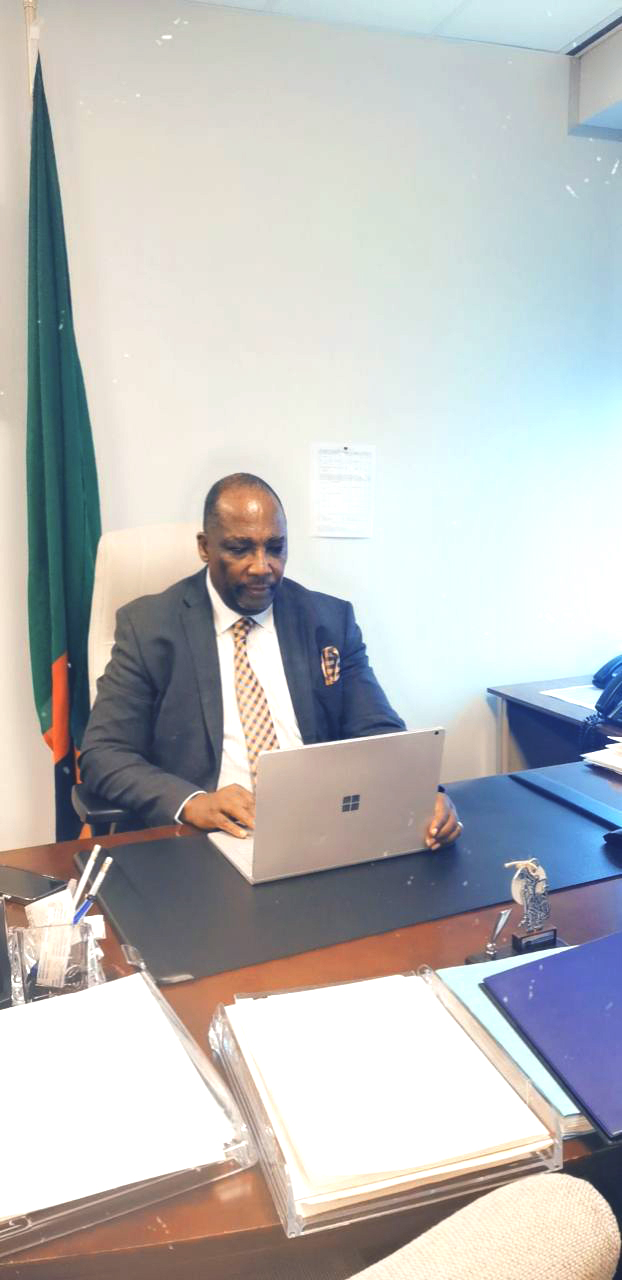
FOR IMMEDIATE RELEASE
WITH PICTURE
AUGUST 27 2024
How Sustainable Aviation Fuel Could Transform African Air Travel Beyond Going Green

LUSAKA, ZAMBIA – Imagine taking to the skies knowing the fuel powering that flight came from Africa, created by our people. SAF isn’t just about cleaner air, it’s about African self-reliance in aviation.
The recent announcement that six African countries are set to produce Sustainable Aviation Fuel (SAF) marks a significant milestone in the continent’s aviation industry. As a representative of Proflight, Zambia’s leading airline, I had the privilege of attending the AviaDev conference, where this exciting development was discussed alongside other crucial topics shaping the future of African aviation.
The push towards SAF production in Africa is not just a step towards environmental sustainability; it’s a strategic move that could revolutionise our aviation sector. At AviaDev, I learned about innovative methods for producing SAF, including the use of water and air. This revelation was particularly exciting, as it presents a potential solution to one of the biggest challenges facing SAF adoption: cost.
Currently, traditional SAF, produced from agricultural products and solid waste, is approximately four times more expensive than conventional jet fuel. This price differential has been a significant barrier to widespread adoption. However, the new methods discussed at AviaDev could dramatically reduce production costs, making SAF a more viable option for airlines across the continent.
The focus on making SAF production cheaper and more sustainable could be a gamechanger for Africa. Our continent has vast untapped resources that could be leveraged for SAF production. We have abundant land, a youthful population, and significant water resources. These assets position Africa to become a major player in the global SAF market.
I’m particularly proud to share that Zambia is at the forefront of this initiative. We are currently in discussions with the World Bank and the International Civil Aviation Organization (ICAO) to explore SAF production in our country. This project, which is already at the feasibility stage, could make Zambia the first African nation to produce SAF at scale.
The potential benefits of local SAF production extend far beyond environmental considerations. By producing SAF in Africa, we can reduce our dependence on imported fuel, create jobs, and stimulate economic growth. Moreover, as SAF becomes more readily available and affordable, it could attract more airlines to fly to and within Africa, boosting our tourism and trade sectors.
However, the journey towards widespread SAF adoption in Africa is not without challenges. We need to address issues such as infrastructure development, regulatory frameworks, and funding. Collaboration between governments, airlines, and international organisations will be crucial in overcoming these hurdles.
At AviaDev, there was a strong emphasis on collaboration across the aviation industry. This spirit of cooperation is essential if we are to realise the full potential of SAF in Africa. Airlines, airports, governments, and fuel producers must work together to create a sustainable and profitable SAF ecosystem.
Another key takeaway from AviaDev was the importance of government support in developing new routes and promoting aviation growth. As we look to expand SAF production and usage, similar support will be crucial. Governments can play an important role by providing incentives for SAF production and use, investing in necessary infrastructure, and creating favourable regulatory environments.
The move towards SAF aligns perfectly with other initiatives aimed at boosting African aviation. The Single African Air Transport Market (SAATM) and the African Continental Free Trade Area (AfCFTA) are set to increase air connectivity and trade across the continent. As these initiatives take off, the demand for air travel – and consequently, for sustainable fuel options – will only grow.
Moreover, the focus on SAF comes at a time when Africa’s aviation sector is poised for significant growth. Despite currently accounting for only 2% of global air traffic, Africa has tremendous potential for expansion. The International Air Transport Association (IATA) predicts that Africa will be one of the fastest-growing aviation regions in the coming decades. By investing in SAF now, we are preparing for this future growth in a sustainable manner.
The tourism sector, which is closely linked to aviation, also stands to benefit from SAF development. As African countries increasingly recognise the economic potential of tourism, sustainable air travel options will become even more critical. SAF can help position Africa as a responsible and forward-thinking tourism destination, attracting environmentally conscious travellers from around the world.
As we move forward, we need to continue investing in research and development of SAF technologies. The water and air-based production methods discussed at AviaDev are just the beginning. By fostering innovation in this field, we can ensure that Africa remains at the cutting edge of sustainable aviation technology.
The announcement of six African countries venturing into SAF production is a watershed moment for our continent’s aviation industry. It represents not just a commitment to environmental sustainability, but a strategic move towards greater self-reliance and economic growth. At Proflight, we are excited to be part of this journey and are committed to supporting the development and adoption of SAF in Zambia and across Africa.
By Vincent Banda, Director Ground Operations, Cargo and Catering, Proflight Zambia
-Ends-
About Proflight Zambia
Proflight Zambia, established as a scheduled airline in 2005, is Zambia’s leading airline. Operating from its base in Lusaka its domestic routes include Livingstone, Mfuwe, Ndola, Solwezi, Kalumbila, Mansa, and Kasama, seasonal safari routes to Chunga airstrip in Kafue National Park and Jeki/Royal airstrips in Lower Zambezi; and regionally to Durban, Johannesburg, and Cape Town in South Africa from Lusaka.
The airline prides itself in providing a safe, reliable, efficient, and friendly service, and offering good value to business and leisure travellers locally and internationally.
The airline operates four 50-seater Bombardier CRJ-100/200 jets, a Bombardier CRJ-100 Freighter Jet, four 29-seater Jetstream 41 aircraft and one 18-seater Jetstream 32 aircraft.
More information is available at www.flyzambia.com.
For media inquiries, please contact:
Gillian Langmead at Langmead & Baker Ltd;
+260 979 060705;
info@langmead.com

